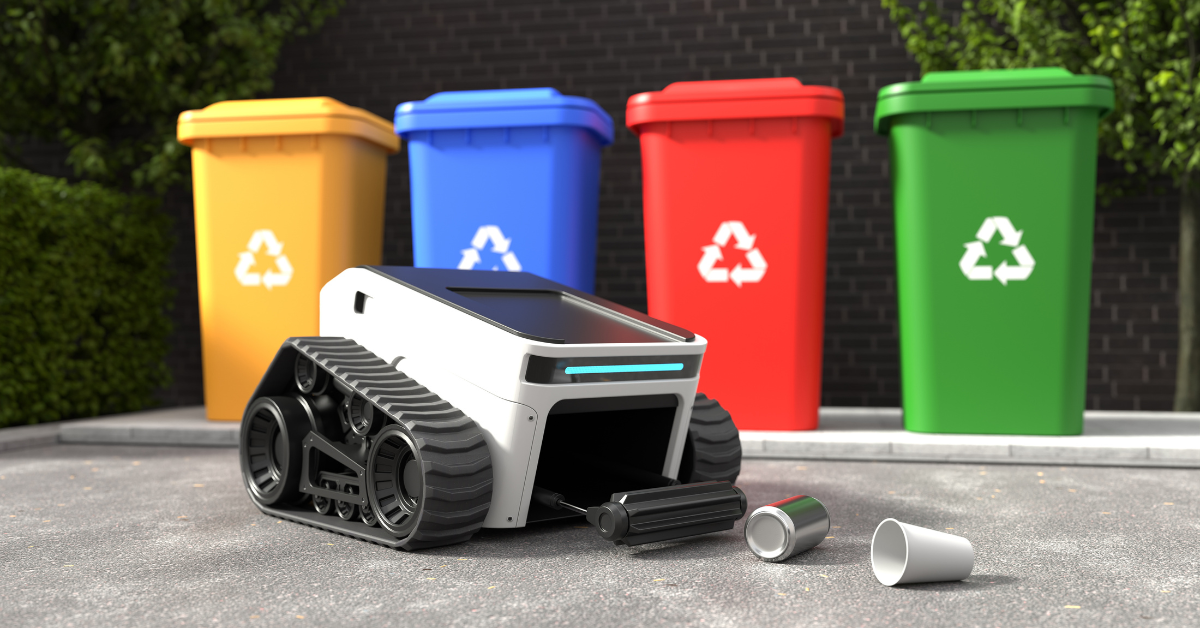
AI and Robotics have become key players in many industries, whether it’s online AI assistants to screen you before going to an in-person doctor, or a robot working on reception at a hotel (yes, in Japan). Both AI and robotics are here to help us instead of hinder us, and waste management is no exception.
Waste management is at the forefront of many countries' ESG goals, whether it’s to make population-dense cities more sustainable or simply make places cleaner. How we process and collect waste has changed exponentially, and AI and Robotics have made this possible.
Predictive analysis
Predictive analysis has enabled organisations and even whole cities to predict the amount of waste that is going to be present and when it can be collected. This is achieved using smart bins that communicate to a centralised dashboard indicating when bins are full or reaching their capacity.
Predictive analysis can then use this information to optimise collection times and understand waste management trends, whether this is the volume of waste or the type of waste that is collected.
Smart bins
The aforementioned smart bins can be used across cities and organisations, but they can also be used in your homes. Whether they rely on robotic components to ‘self-change’ bags, or ergonomically designed to suit your environment, smart bins are all around us and are positively impacting how we view and handle waste.
However, smart bins outside of the home dominate busy cities that are conscious of their waste management and recycling initiatives, with cities such as Amsterdam, New York, and Singapore taking the reins!
“Amsterdam has implemented a number of innovative technologies to improve the efficiency and sustainability of its waste management system. For example, the city has implemented a smart waste collection system that uses sensors to monitor the fullness of trash cans, and to optimize the routes taken by waste collection trucks.
This has helped to reduce the environmental impact of waste management and to save the city money. Amsterdam has also implemented a number of recycling programs, including a program that encourages residents to separate their waste into different bins for different types of materials.” - Superfy
Automated waste sorting
Automated waste sorting is a by-product of AI, enabling recycling to be more effective and sending less waste to landfills. They help to reduce the reliance on manual labour and also can keep workers away from hazards, improving worker safety and working conditions. Toxic and hazardous waste can still be handled but in a contained environment!
“By enhancing sorting accuracy, AI can significantly reduce the volume of waste sent to landfills and increase the number of materials recovered for recycling. This not only preserves natural resources, but it also reduces greenhouse gas emissions associated with the production of new materials” - [source]
Robots for waste collection
Robots are increasingly being used for waste collection, whether it’s autonomous waste collection vehicles that work in restaurants, offices, or on the street. Within larger-scale waste collection/sorting facilities, robotic arms are also used heavily to handle large volumes of waste or toxic waste.
These can be controlled by humans or by pre-programmed algorithms! Although it can be argued that robots have the potential to “steal” jobs, they are in fact improving the efficiency of waste collection and taking a lot of risk away from people’s day-to-day lives who work within a waste collection/sorting facility.
Why are we talking about this?
You may be thinking, how is this all relevant to the world of technology, or even recruitment? We are consistently partnering with new and innovative organisations all over the world, and the crossover that robotics and AI have with multiple industries continues to grow, so the demand for talent within new markets will grow, too.
AI and robotics are here to stay, whether we see them as ‘good’ or ‘evil’. We’re interested in seeing how waste management and recycling continue to adopt AI and robotics into the fibres of their industry and how this will impact talent demands in the next 3–5 years.
What do you think?



